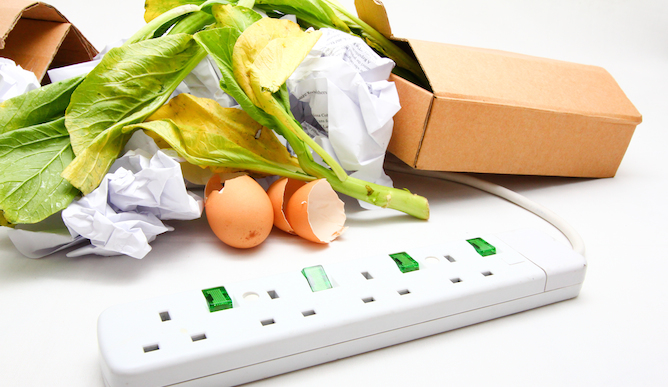Close to half of the food that the world produces goes to waste, whether it’s on the farm, at the production or packaging plant, or from the dinner plate. An Israeli company with past experience in building renewable energy plants in China has stepped up to the plate in America, aiming to transform food waste to biofuel.
Israel-based Bluesphere, founded in 2010, is now building a 5.2-megawatt waste-to-energy power plant in Charlotte, North Carolina. An anaerobic digester will convert food and organic waste into biofuel, to be turned into electricity onsite using steam turbines.
The Bluesphere project is backed by $17.8 million in financing from Caterpillar and another $6 million from an undisclosed clean-tech fund.
Once the system is operating, it will be able to offset the energy costs of 2,500 homes in North Carolina every year, and another 1,500 homes in Rhode Island in the same timeframe once the company’s second plant comes online. The first plant is expected to be operating by 2015; the second by 2018.
Bluesphere plans to take in organic waste and then sell the end-product as renewable energy and compost. Two major energy purchasers, Duke Energy and National Grid, have signed on to buy power from Bluesphere for the long term. One of the largest privately held composting companies in the world says that it will buy compost generated by the plant.
“Our skill is squeezing out the value of every project,” Bluesphere chief carbon project developer Mark Radom tells ISRAEL21c.
The structure of the deal and the fine-tuned details of the plant are what makes this project innovative, says Radom, who is a lawyer by training and worked extensively in the area of carbon credits in the UK before the bottom fell out of the green bucket.
Energy from last night’s leftovers
While the business model seems lucrative –– basically taking trash and turning it into money, “There are barriers to entry,” says Radom, pointing out that they had to put together some $25 million in financing to make the project work.
“The details and the minutiae are very complicated,” he tells ISRAEL21c. But he is not worried that the waste will run out one day.
“As long as there are people, there will be waste. In the US, the amount of variation, even in a bad year, shows they are not [generating] less waste,” says Radom.
All manner of organic waste is good to go in the Bluesphere system, from the pasta salad you didn’t eat last night to all the farm waste one can imagine. Anything that would normally be sorted in a green bin as organic waste is suitable.
Often overlooked as a renewable energy, waste-to-energy (WTE) — also called refuse-derived fuel (RDF) — is a growing segment in the renewable energy market. SBI Energy estimates the market will reach $29 billion by 2022.
Environmental advocates say this is one strategy the United States should take to reduce its dependence on foreign oil, while reducing climate-change-causing greenhouse gases and achieving green energy security.
WTE is still considered in its early stages in the US, but it has a lot of potential to solve problems beyond the carbon question. According to Bluesphere CEO Shlomi Palas, WTE diverts organic waste that would be buried in landfills and repurposes it for something positive.
11 more Bluesphere plants planned
With the abundance of open land in the US, unlike in Europe, Americans have been slow to adopt the practice of turning organic matter into fuel. Some believe that the best solution is more WTE plants, but at the same time educating the packing industry so that fewer burnable materials will be sent to landfills.
New restrictions on burying waste in the US are expected to give Bluesphere a competitive edge.
To date, there are only about 200 biogas generating plants like it in the US, as compared to some 7,000 in Germany.
Bluesphere employs five people in Tel Aviv, two in the US and one in Africa. In addition to the plants in North Carolina and Rhode Island, 11 additional plants are on the drawing board, with six already under development.
“I would not say our product is superior,” says Radom. “It is energy and it is fungible. What’s unique is our approach. Other companies in the US tend to get involved in this business because they are farmers and have a lot of manure or are in the compost business or connected to the waste industry.
“We came in through another way,” he says, hinting that his skilled business team with Israeli chutzpah will be able to squeeze a lot of great green energy out of waste because they come from the energy business.
For more information, see www.bluespherecorporate.com
















